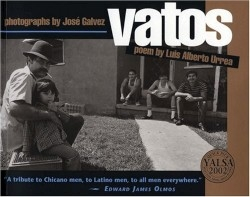Vatos
“Historically, I knew women had been ignored and erased. But I suddenly realized that, outside the historical record, the men were also ignored and erased. The modern Xicano/Mexicano/ Latino man was invisible.” This strong belief that someone had to speak out, be a voice for all these fathers, uncles, and brothers, drove Urrea to create the Hymn to Vatos; vatos who will never be in a poem. Chiefly of Los Angeles, California and Tucson, Arizona, these vatos, the dudes/guys, are represented through the words of this litany. Well outside the usual style of what is considered mainstream contemporary poetry, Urrea draws strongly upon the repetition of oral tradition and in his own words, the poem is like the chanting of “100 grandmothers praying to Guadalupe.” The more distant indigenous roots of the Americas are also evident.
The rhythm Urrea produces flows along the pages under an arresting collection of photographs taken by Galvez over the past thirty years. Each photo is captioned and dated, and a helpful and informative index is provided at the end of the poem and photos. The index section, entitled Photo Captions, takes the thoughts provoked by the poetry and photography to a more complex level. In reading the caption of an already striking photo entitled “Don Marcos Romero, 1978,” the flat black eyes of an almost unbelievably old man suddenly harden into the challenging focus of a man who has seen more than most people, and knows it. He gazes out from under his straw ranchero hat, a Mexican flag draped behind a portrait of the crucifixion that hangs on the wall of his Tucson home. He sits on the iron-framed bed for his portrait. “Don Marcos Romero, AKA El Charro Negro. He rode with Pancho Villa.”
In other photos, readers see first communions, car-hopping competitions, Pachuco gangsters dressed to the nines, war veterans, farm workers, tattooed vatos in public parks, and vatos double-clutching Budweiser cans. A grandfather holds onto his small grandchild as if he is holding on for his life. In fact he is, holding onto his very life itself. In “Altar Boys 1986,” a boy with a divine expression seems to be miles away from the two clowning fellows he stands between. Where he seems celestial and somehow elevated above worldly concerns, in his alb, the other boys appear childish.
Urrea is a novelist, essayist, and poet who resides with his family in Chicago where he teaches. He has received many awards including the American Book Award and the Western States Book Award for Poetry. Galvez is a Pulitzer Prize winning photographer who has worked with the L.A. Times and other newspapers, in addition to freelance photojournalism.
“All you vatos, you are not forgotten.”
Reviewed by
Gabrielle Shaw
Disclosure: This article is not an endorsement, but a review. The publisher of this book provided free copies of the book to have their book reviewed by a professional reviewer. No fee was paid by the publisher for this review. Foreword Reviews only recommends books that we love. Foreword Magazine, Inc. is disclosing this in accordance with the Federal Trade Commission’s 16 CFR, Part 255.

